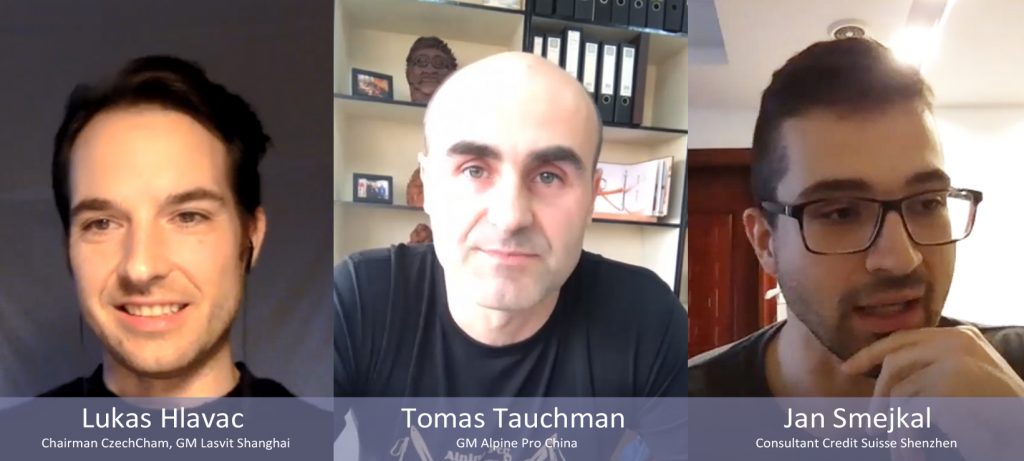On March 5th 2020, CzechCham organized its first webinar discussing the impact of the coronavirus on foreign businesses in China, tackling the question of resumption of production in China, sales and trade during the epidemic, as well as the Chinese state support for firms. More than 40 people have joined the webinar.
The webinar was hosted by three seasoned experts on business in China, Mr Lukas Hlavac, the chairman of CzechCham and GM Lasvit Shanghai; Mr Tomas Tauchman, GM Alpine Pro China; and Jan Smejkal, a consultant for Credit Suisse Shenzhen.

Mr Tauchman has shared his advice on how to deal with a crisis as a foreign company in China. Chinese ‘guanxi’, or building relationships, offers a flexible solution for any crisis that might arise in China, and it’s a way how to be always one step ahead. He stressed out that long-term systematic building of ‘guanxi’ with local government officials is the key, however, most managers of Czech firms in China rather underestimate it.
“Long-term systematic building of ‘guanxi’ with local government officials is the key, however, most managers of Czech firms in China rather underestimate it.”
Tomas Tauchman, GM Alpine Pro China
Regarding the resumption of production, Alpine Pro was facing two problems, that is lack of employees as well as deciding whether to resume immediately or to delay. Thanks to the good relations with local officials, and therefore being well informed, Alpine Pro was one of the first companies to resume production in Jiaxing, a city with more than 30000 firms. 20% of the company’s key-position employees were from Hubei province, so the employee shortage has been dealt with by hiring temps. Moreover, the company has to be ready to provide face masks, thermometers, disinfection, as well as hygienic informative materials. The strict government checks to see if the company complies with all regulations during the coronavirus epidemic happen every second day.
Mr Smejkal then talked about the current discontinuation of conferences, trips a business development in China, especially if you want to do business development with a Chinese firm and you are not their top priority. Most Chinese companies have more pressing issues to pay attention to at the moment, some even experience increase in business, such as gaming and social media companies, at therefore they have to stay focused at their main business. Mr Smejkal said that this week, things start to get back to normal, he starts to have meetings with big firms, such as Tencent, to continue their conversation about projects from before the Chinese New Year. “One must be patient with projects involving government entities, as they have rather different priorities during the coronavirus outbreak”, he added.
“One must be patient with projects involving government entities, as they have rather different priorities during the coronavirus outbreak.”
Jan Smejkal, a consultant for Credit Suisse Shenzhen
On the question whether foreign firms will be withdrawing from China, Mr Smejkal pointed out that for those companies China is their strategic partner, things might slow down a bit, however, it can speed up opportunities too. Before the crisis, there was an influx of foreign firms who wanted to establish contacts with Chinese firms, such as Alibaba, with a hope to learn from them and apply the knowledge to their own businesses. Therefore, an interesting opportunity arises – if you, as a company, don’t give up and continue to pursue your projects, you show the Chinese company your dedication and that you are in it for long term.
How has the coronavirus affected day-to-day business at his company? Cancelling business trips, conferences and finding ways how to do everything online without compromising quality. They have started to have daily calls with investors, who are interested in information about the impact on economy and technology. Meanwhile, the company is building an online community during this difficult time.
Next, Mr Hlavac has shared his presentation in which he summed up the impact of coronavirus on foreign firms in China. The situation in Shanghai and in China is stabilized, except for Hubei province. The majority of companies resumed production, however they still struggle with the lack of employees. The lack of employees surprisingly puts pressure on salary increase, with some industries increasing salaries quite significantly. From all affected countries by coronavirus, China is expected to be the first country to recover and get back to normal. According to McKinsey and their recently published report, the most likely scenario suggests that if there are no new epicentres worldwide, China should get back to normal in Q2, Europe and other regions then in Q3, along with air transportation and consumer confidence. The more pessimistic version speculates that if new epicentres appear it may result in global economic recession in 2020.
According to the European Chamber of commerce, most foreign firms in China expect drop in revenues of over 20%. What makes the situation more difficult is the inconsistency of regulations coming from the central and local governments, and therefore having a good Chinese team to navigate through all of this is essential. 70% of European companies in China have donated some kind of humanitarian aid, which is well received by the Chinese, who appreciate the help and support during this difficult time.
Mr Hlavac then shared his company’s experience during the epidemic. All employees coming back to Shanghai are in 14-day home quarantine, including himself after coming back from Europe. Mr Hlavac recommends opting for the most conservative measure in crisis like this, to avoid possible bigger problems. Apart from daily temperature-taking, Lasvit offers flexible working time, home office, floating worktime, online meetings including those on-site, unless it’s absolutely necessary.
What are the possibilities of receiving the Chinese government aid? The government offers certain financial aid to foreign firms as well, such as tax alleviation and tax exemption. For example, companies with zero or minimal lay-offs can apply for a discount from last year’s social insurance. Due to all these, Lasvit projects to save up to 60K US dollars.
“The government offers certain financial aid to foreign firms , such as tax alleviation and tax exemption. For example, companies with zero or minimal lay-offs can apply for a discount from last year’s social insurance. Due to all these, Lasvit projects to save up to 60K US dollars.”
Lukas Hlavac, the chairman of CzechCham and GM Lasvit Shanghai
The webinar has ended with a follow-up QA session with all the participants.
Stay tuned for more webinars to come!

